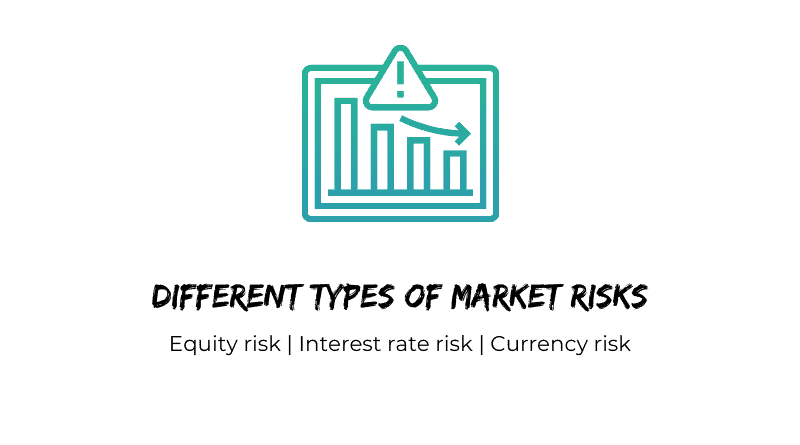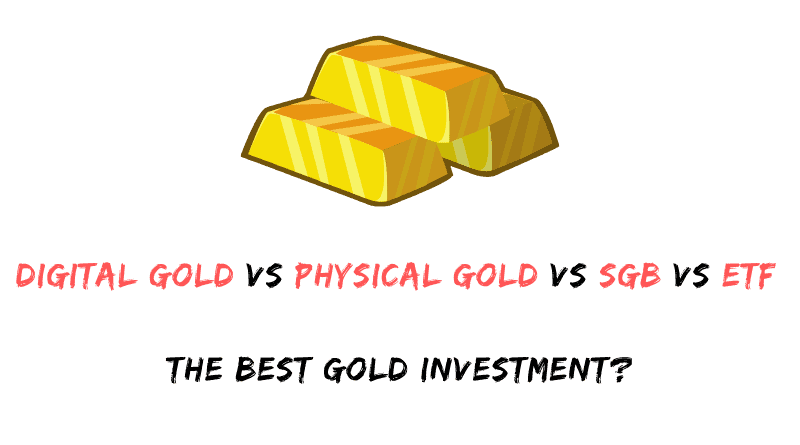Stock market risks can be classified into 3 types:
Equity risk
The risk associated with the continual up and down fluctuation of stock prices in the stock markets is referred to as this risk.
Let’s assume you acquired stock for Rs 50 today with the intention of selling it in 6 months.
Unfortunately, the stock price has dropped to Rs 30 in the last six months.
This is a risk.
One of the reasons why many investors avoid short-term stock market investments is equity risk.
Interest rate risk
This risk arises from a decrease in interest rates, as the name suggests.
Interest rate fluctuations may have a negative impact on bond prices, something most of us are unaware of.
Debt mutual funds invest in a variety of assets, including bonds.
Currency risk
When you invest in many countries, you run the danger of this happening.
Assume you invested in the US market. You earned a good profit.
However, while transferring funds back to India, you’ll notice a significant difference in the exchange rate between the US dollar and the Indian rupee.
As a result, you did not get the large profits you anticipated in this situation.
Currency risk is the name for this type of risk.
A few additional risks:
Liquidity risk
The capacity to convert your asset into cash is referred to as liquidity.
More liquid assets are those that can be turned into money quickly rather than others that require longer.
Example:
Your funds are held in a mutual fund, from which you can withdraw them in 4 working days.
Also, because your money is invested in real estate, selling it might take weeks or months.
Mutual funds are seen as more liquid than real estate here.
The risk of not being able to turn your asset into money at the rate you expect is known as liquidity risk.
For example, there are occasionally no buyers or sellers at the targeted price for some shares.
It becomes difficult to buy or sell that stock at that moment. Liquidity risk is one example of this.
Concentration risk
Concentration risk is the danger that develops when too much money is invested in a single asset.
Assume you have a total investment budget of Rs 1 lakh.
You invest Rs 80 thousand in one stock and the balance in a variety of equities.
Concentration risk is exemplified here.
Your money is held in one location for too long. If something occurs to that firm that has a negative impact on its pricing, you will lose a significant portion of your investment.
What is the appropriate investment amount to minimise concentration risk? There is no such thing as a level. It differs from one investor to the next and from one asset to the next.
Credit risk
Bond investments are subject to credit risk.
Bonds are, in a sense, loan investments.
Credit risk occurs when a borrower falls into financial difficulties and is unable to repay the borrowed funds.
Credit risk varies depending on who you are and what you do.
The credit risk is minimal if the business is reliable, stable, and trustworthy, and it is more likely to repay the borrowed amount and interest.
Inflation risk
Your money’s purchasing value is continually being eroded by inflation.
In the year 1980, 100 rupees meant 1500~2500 rupees as a comparison to now. A bottle of water costs Rs 20 these days. It was significantly cheaper ten years ago. Check the rate of inflation along with the value of the rupee over time (by year) here or any other currency here.
Inflation is the reason behind this.
The risk of your return on investment not being able to keep up with inflation is known as inflation risk.
Let’s assume you get a 5% return on your investment. Let’s pretend that inflation is 6% at the same time.
You did not receive any returns on your investment in this situation.
In reality, you dropped by 1%.
Inflation risk refers to the possibility that your investment may not generate a larger return than inflation.
Timing Risk
Assume you made a large sum of money by selling another asset or earning some other significant gain.
You’ve decided to put this money into the stock market for the long term.
Assume you put down the whole sum in one go.
But, because of the times, the markets sank or plummeted after you invested.
Your money is now worth a fraction of what you paid for it.
This is known as timing risk.
There are methods for dealing with this type of risk.
When it comes to mutual fund investing, it is recommended that you use STP (Systematic Transfer Plan).
Explore several techniques for reducing timing risk.
Information Risk
The risk that emerges from incorrect or erroneous information is known as information risk.
Short-term investors may appear to be more affected by incorrect information, leading to poor investments. However, this isn’t fully accurate.
For long-term investors, inadequate information can also lead to poor judgements.
Due to a lack of knowledge, many investors continue to invest in low-quality or ill-fitting mutual funds for years.
Make sure you’re dealing with factual information that hasn’t been tainted by someone’s bad motives.
Systematic Risk
Unlike unsystematic or idiosyncratic risk, systematic risk refers to the volatility of the whole market, not just one stock or industry.
It’s a type of risk that’s both unforeseen and unavoidable.
The effect of economic, geopolitical, and financial variables is reflected in systemic risk, which is intrinsic to the market as a whole.
To reduce this risk, investors try to create a well-diversified portfolio.
Conclusions
Risks come in a variety of shapes and sizes. The risks listed above are only a handful of the most common ones. Spend more time learning about different types of risks and how to mitigate them.

















